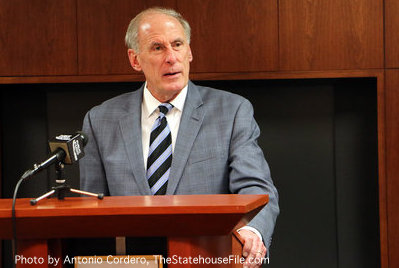Subscriber Benefit
As a subscriber you can listen to articles at work, in the car, or while you work out. Subscribe NowPresident-elect Donald Trump has selected former Indiana Sen. Dan Coats to lead the Office of the Director of National Intelligence, a role that would thrust him into the center of the intelligence community Trump has publicly challenged, a person with knowledge of the decision said Thursday.
Coats, 73, served as a member of the Senate Intelligence Committee before retiring from Congress last year. If confirmed by the Senate, he would oversee an agency created after 9/11 to improve coordination of U.S. spy and law enforcement agencies.
The person with knowledge of Trump's decision was not authorized to discuss the pick publicly and spoke on condition of anonymity.
Coats, a graduate of the Indiana University Robert H. McKinney School of Law in Indianapolis, was a U.S. House member from 1981 until 1989, when he moved to the U.S. Senate to fill out the unexpired term of Dan Quayle, who became vice president.
Coats won election to a full, six-year term in 1992 but opted not to seek reelection in 1998.
Coats later served as U.S. ambassador to Germany and as a lobbyist before getting re-elected to the Senate in 2010.
Republican Todd Young, who took Coats' seat in the Senate, said in a statement Thursday that he couldn't "think of an individual I trust more to advise the president and direct our intelligence operations than Sen. Coats."
"He deserves all the accolades he will receive in the coming days," Young said. "This is an excellent pick by President-elect Trump.”
Gov.-elect Eric Holcomb, who worked for Coats, called the former senator a "trusted leader who will serve our nation well as our director of national intelligence."
"He has the ideal temperament and experience for the job, and his depth of knowledge on foreign policy is second to none," Holcomb said in a statement. "His appointment sends a strong message that an experienced statesman is in charge of this key area."
Since Trump prevailed over Hillary Clinton, the president-elect has questioned intelligence officials' assessments that Russia interfered with the election on his behalf. On Friday, senior intelligence officials will brief Trump on the findings of a full report into the Russian hacking of Democratic groups. The report was ordered by President Barack Obama, who was briefed on the conclusions Thursday.
Against that backdrop, Trump has been considering ways to restructure intelligence agencies to streamline operations and improve efficiency. Transition officials have been looking at changes at both ODNI and the CIA, but those plans are said not to be aimed at gutting the intelligence agencies or hampering their capabilities.
The discussions are also independent of Trump's public challenge to the intelligence community's Russia assessment, the person said with knowledge of Trump's transition decisions said. The Wall Street Journal first reported Wednesday night that Trump was looking at ways to streamline the intelligence agencies.
Trump transition spokesman Sean Spicer denied Thursday that Trump was considering "restructuring the intelligence community infrastructure."
"There is no truth to this idea of restructuring the intelligence community infrastructure. It is 100 percent false," Spicer said.
Trump's administration wouldn't be the first to initiate an intelligence community reorganization.
A few years ago, CIA Director John Brennan ordered sweeping changes to the CIA to make its leaders more accountable and close intelligence gaps amid concern about the agency's limited insights into a series of major global developments.
The aim was to break down barriers between the CIA's operations and analytical arms. Historically, case officers who recruit spies and run covert operations have sometimes worked for different bosses in different offices than the analysts who interpret the intelligence and write briefing papers for U.S. officials.
The CIA declined to comment on the potential changes, while outgoing National Intelligence Director James Clapper told a Senate panel Thursday that his office has not been engaged in such discussions with the Trump transition team. He noted that lawmakers created his office.
"Congress, I think, gets a vote here," said Clapper, who was testifying on Russia's election interference.
Intelligence agencies have concluded that there is no question that Russia was behind hacking of political computer systems—something they say could only have occurred with the approval of top Kremlin officials. That conclusion is detailed in the classified report Obama ordered up on Russia and other foreign influence in U.S. elections dating back to 2008.
Please enable JavaScript to view this content.

